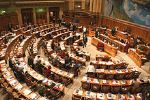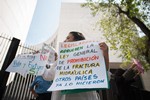Published on Fri, 2016-07-29 09:56
In the implementation phase of the 2030 Agenda for Sustainable Development, it is important to learn from the mistakes of the past and to truly advance a holistic framework. From DAWN’s perspective, using an interlinkages and rights-based approach to the implementation of the Sustainable Development Goals (SDG) might be useful to assess and promote positive synergies. This article offers ideas for achieving this by looking at the example of how tackling illicit financial flows could help the fight against women’s trafficking. |
Published on Fri, 2016-07-22 19:03
The negative impact on developing countries of the secrecy of the Swiss banking system, which encourages damaging tax evasion, corruption and illicit financial flows, was highlighted by civil society when Switzerland submitted its report about the 2030 Agenda to the United Nations. "Switzerland continues to host the largest offshore financial centre in the world" says the alternative report of Aliiance Sud. In 2015, Swiss banks administered foreign assets in the total amount of 2,300 billion francs. |
Published on Fri, 2016-07-22 18:59
The Mexican legal framework on energy amended in 2013 and 2014 presents obstacles to the exercise of human rights as well as to achieving the SDGs, as it prioritizes the activities of exploration and exploitation of hydrocarbons "over any other involving the use of the surface and subsurface of the lands concerned". The framework establishes several legal provisions such as the determination of legal easements for hydrocarbons to public, private, national and transnational energy projects (some of which employ harmful techniques such as hydraulic fracturing or fracking), which constitutes a regression in terms of human rights and the environment, while seriously compromising the achievement of the SDGs. |
Published on Tue, 2016-07-19 11:59
How much is tax collection dependent on the policies of one individual country? When discussing tax policy a common tendency used to be to treat it as an exclusively domestic policy matter, one to which only the prerogatives and obligations of the State where the respective taxes are to be collected are relevant. Reality could be nothing further from the truth, as demonstrated by the amounts of revenue that get lost to tax evasion and avoidance by international actors because of their ability to straddle across a diversity of national jurisdictions. As more of such tax maneuvers come to light, international cooperation for tax matters gains more prominence on the development finance agenda. |
Published on Mon, 2016-07-18 11:42
Inequality has been center stage at the United Nations headquarters in recent days, as government officials, development experts and civil society representatives gathered for the first meeting of the High-Level Political Forum on Sustainable Development (HLPF) since the Sustainable Development Goals (SDGs) were agreed. The HLPF is the main platform for the follow-up and review of the 2030 Agenda for Sustainable Development. The theme of this year’s HLPF – and one of the most potentially transformative elements of the Agenda – is the critical commitment to “leave no one behind.” |
SUSCRIBE TO OUR NEWSLETTER






